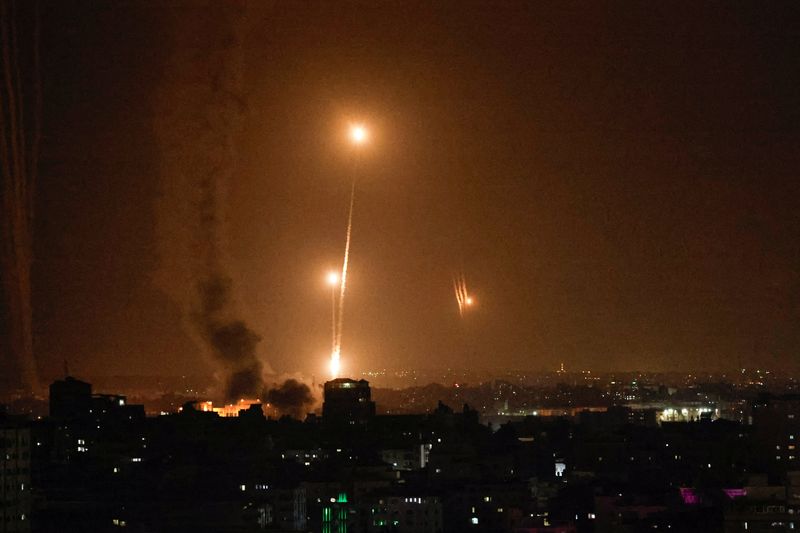
© Reuters. Rockets are fired from Gaza toward Israel, in Gaza, October 7, 2023. REUTERS/Mohammed Salem
2/5
By Maayan Lubell, Nidal al-Mughrabi and Ammar Awad
JERUSALEM/GAZA/SDEROT (Reuters) – Israeli forces clashed with gunmen from the Palestinian group Hamas on Sunday, 24 hours after the militants launched a surprise attack on Israel in which nearly 500 people were killed in the deadliest day of violence in Israel for 50 years.
The biggest incursion into Israel in decades could undermine U.S-backed efforts to forge regional security alignments that could threaten Palestinian aspirations for statehood and the ambitions of the group’s main backer, Iran.
Hamas fighters began their attack at dawn on Saturday with a huge barrage of rockets into southern Israel, giving cover to an unprecedented, multi-pronged infiltration of fighters into Israel from Gaza, a narrow strip that is home to 2.3 million Palestinians.
Hamas fighters killed at least 250 Israelis in clashes through the day and escaped back into Gaza with dozens of hostages. More than 230 Gazans were killed when Israel responded with one of its most devastating days of retaliatory strikes.
“We will take mighty vengeance for this wicked day,” Prime Minister Benjamin Netanyahu said on Saturday.
Israeli troops battled Hamas gunmen through the night in parts of southern Israel. An Israeli army spokesperson said on social media the situation was not fully under control.
The escalation comes against a backdrop of surging violence between Israel and Palestinian militants in the Israeli-occupied West Bank, where a Palestinian authority exercises limited self-rule, opposed by Hamas that wants Israel destroyed.
The West Bank has seen stepped-up Israeli raids, Palestinian street attacks and assaults by Jewish settlers on Palestinian villages. Conditions for Palestinians have worsened under Netanyahu’s hard-right government. Peacemaking has been stalled for years.
‘WE WARNED YOU’
Hamas leader Ismail Haniyeh said the assault that began in Gaza would spread to the West Bank and Jerusalem. Gazans have lived under an Israeli blockade for 16 years.
In a speech, Haniyeh highlighted threats to Jerusalem’s Al-Aqsa Mosque, the continuation of an Israeli the blockade on Gaza and Israeli normalization with countries in the region.
“How many times have we warned you that the Palestinian people have been living in refugee camps for 75 years, and you refuse to recognise the rights of our people?”
Bodies of Israeli civilians surrounded by broken glass were strewn across the streets of Sderot in southern Israel near Gaza. The bodies of a man and woman were sprawled across the front seats of a car.
Terrified Israelis, barricaded into safe rooms, recounted their plight by phone on live television.
Senior military officers were among those killed in fighting near Gaza, the Israeli military said.
Netanyahu’s office said his security cabinet had approved steps to destroy the military and governmental capabilities of Hamas and Islamic Jihad, another militant group, “for many years”, including cutting electricity, fuel supplies and the entry of goods into Gaza.
In Gaza, black smoke, orange flashes and sparks lit the sky from explosions. Israeli drones could be heard overhead.
Gaza’s dead and wounded were carried into crumbling and overcrowded hospitals with severe shortages of medical supplies and equipment. The health ministry said 232 people had been killed and at least 1,700 wounded.
BIDEN OFFERS SUPPORT TO NETANYAHU
Western countries, led by the United States, denounced the attack
At the White House, President Joe Biden went on national television to say Israel had the right to defend itself, issuing a blunt warning to Iran and other countries: “This is not a moment for any party hostile to Israel to exploit these attacks to seek advantage. The world is watching.”
The United States has been seeking a deal to normalise ties between Israel and Saudi Arabia, seen by Israelis as the biggest prize yet in their decades-long quest for Arab recognition. Palestinians fear any such agreement could sell out their dreams of an independent state.
Osama Hamdan, the leader of Hamas in Lebanon, told Reuters that Saturday’s operation should make Arab states realize that accepting Israeli security demands would not bring peace.
Across the Middle East, there were demonstrations in support of Hamas, with Israeli and U.S. flags set on fire and marchers waving Palestinian flags in Iraq, Lebanon, Syria and Yemen. Iran and Hezbollah, Iran’s Lebanese allies, praised the Hamas attack.
Hamas deputy chief Saleh al-Arouri told Al Jazeera the group was holding a large number of Israeli captives, including senior officials. He said Hamas had enough captives to make Israel free all Palestinians in its jails.
Hamas said the attack was driven by what it called escalated Israeli attacks on Palestinians in the West Bank, Jerusalem and against Palestinians in Israeli prisons.
That Israel was caught completely off guard was lamented as one of the worst intelligence failures in its history, a shock to a nation that boasts of its intensive infiltration and monitoring of militants.








